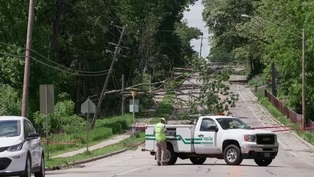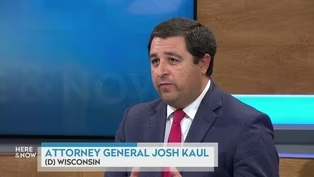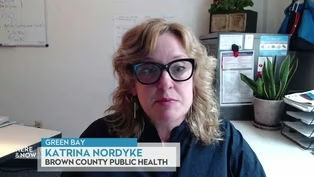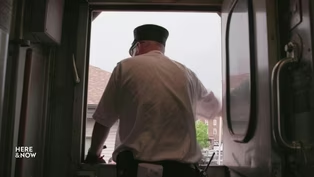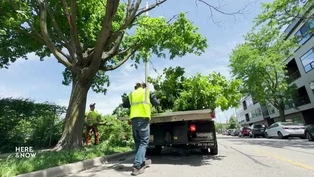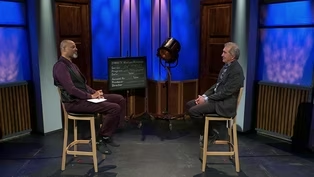Here and Now
Alex Brower on the Social Security Funding Gap and Solutions
Clip: Season 2200 Episode 2245 | 5m 41sVideo has Closed Captions
Alex Brower on the potential for the Social Security trust fund to be empty by 2035.
Wisconsin Alliance for Retired Americans Executive Director Alex Brower discusses the potential for the Social Security trust fund to be empty by 2035, plus solutions like raising the retirement age.
Problems playing video? | Closed Captioning Feedback
Problems playing video? | Closed Captioning Feedback
Here and Now is a local public television program presented by PBS Wisconsin
Here and Now
Alex Brower on the Social Security Funding Gap and Solutions
Clip: Season 2200 Episode 2245 | 5m 41sVideo has Closed Captions
Wisconsin Alliance for Retired Americans Executive Director Alex Brower discusses the potential for the Social Security trust fund to be empty by 2035, plus solutions like raising the retirement age.
Problems playing video? | Closed Captioning Feedback
How to Watch Here and Now
Here and Now is available to stream on pbs.org and the free PBS App, available on iPhone, Apple TV, Android TV, Android smartphones, Amazon Fire TV, Amazon Fire Tablet, Roku, Samsung Smart TV, and Vizio.
Providing Support for PBS.org
Learn Moreabout PBS online sponsorshipinformation and education.
>> Thank you.
the solvency of Social Security forecasts, the retirement and disability programs will be involved in 2035.
It's not that the program won't have money to pay any benefits, but it's when the Social Security Trust Fund reserves of $2.78 trillion will be depleted.
What that means is that without action by Congress, the program will only have enough money in 2035 to pay 83% of benefits, not 100.
Now, that eventuality has advocates for seniors sounding the alarm.
Alex Brower is executive director of the Wisconsin Alliance for Retired Americans.
He joins us now.
Thanks a lot for being here.
having me, Frederica.
I appreciate it.
of retirement age in 2035 and beyond, the prospect of paying into Social Security for their whole working lives and not getting their full benefit seems unfair to.
>> It's completely unfair.
Honestly we believe that.
And actually the Wisconsin Alliance and other advocacy not only should people receive the benefits they're entitled to, but they should be receiving more benefits and that Social Security should be expanded and the agency modernized and remain solvent for decades and decades to come.
>> And so you believe that current beneficiaries should be receiving more in their Social Security benefits?
>> That's correct.
Yeah.
Organization is supporting a bill in Congress right now, the Social Security Fairness Act that's been introduced by Senator Sanders and Elizabeth Warren, that actually expands by $200 per month benefits received to benefit Ceres and also protects the solvency of Social Security by eliminating something called the contribution and benefits base, which is basically the cap on which income is taxed for Social Security purposes.
To have the richest Americans pay their fair share to help keep the program solvent.
effectively become a tax increase, though?
And how well would that go over?
>> Well, it is what we're advocating for.
Yes, it will increase taxes on the wealthiest Americans who we, need to have who need to contribute more to pay their fair share.
Basically, millionaires and billionaires in this country exist because of all the work that we've all done to contribute to their success.
Right?
Everybody buys something on Amazon or on Walmart or any of the department stores and our roads that we pay for with taxes contribute to the millionaires and billionaires being able to get their goods to people's homes.
So no millionaire or billionaire is created in a vacuum.
And so those individuals owe to our collective success.
And that means that everybody who is a worker currently has a full and dignified retirement, so we are asking, yes, we are asking the richest Americans to pay their fair share.
But really , it's pennies compared to the wealth that we've created for them by being American consumers, because that cap on the withdrawal of kind of FICA taxes is $168,000 is added.
>> Anything over that those people do not pay in?
>> That's correct.
Yeah.
So when you receive a paycheck like your like your viewers are know when you receive a paycheck, there's a line called FICA and that contribution that deduction stops at $168,600.
So if you make more than that, you don't receive a FICA tax on that money.
So it's pretty much a regressive income tax where the poorest Americans, pay 100% of their income is taxed for that.
And then the richest Americans don't.
The Social Security Fairness Act, keeps that cap in place, but raises it and lifts it for those making above $400,000 a year.
So we know there are also discussions of raising the retirement age to shore up the program.
>> And that's been done once.
I understand.
But doesn't that effectively short people also?
>> That is correct.
Yeah.
And there's a study that just came out that showed that actually the raising of the retirement age back in the 80s and the Reagan presidency actually shortened the life expectancy of seniors.
So not only does that limit the number of years they're eligible to receive benefits, but it actually limits their life expectancy, because, as we all know, you know, there's a point in your life when you should be able to rest and retire from working, right?
And that is and that is a right that every American should have, no matter what kind of job they had or what profession they worked in.
We think everybody is eligible and do that.
So raising the retirement age would only hurt retired Americans and senior Americans.
>> How important is Social Security to the majority of retirees, including all of those in Wisconsin?
>> Extremely important, every single retiree that I personally know depends on their Social Security check every single month and every retired American who's a member of the Wisconsin Alliance for Retired Americans, depends on it fully.
It drives our economy.
It's what keeps so many seniors out of poverty.
We're arguing that Social Security is one of the largest anti-poverty programs that's States, we have a lot of choices in this country.
I mean, all of this is a political choice, right?
We could choose to roll back the clock and go back to the days before Social Security existed.
But we would have seniors in poverty living on the streets.
And we don't want that.
We want everybody who's worked hard and contributed to this country to live a full and dignified retirement.
>> Alex Brower, thanks very
Here & Now opening for May 24, 2024
Video has Closed Captions
Clip: S2200 Ep2245 | 1m 1s | The introduction to the May 24, 2024 episode of Here & Now. (1m 1s)
Josh Kaul on the Latest Allotment of Opioid Settlement Money
Video has Closed Captions
Clip: S2200 Ep2245 | 6m 43s | Josh Kaul explains where the next $36 million won in an opioid settlement will go. (6m 43s)
Katrina Nordyke on Whooping Cough Outbreak and Vaccines
Video has Closed Captions
Clip: S2200 Ep2245 | 6m 27s | Katrina Nordyk describes the extent of the Green Bay area's outbreak of whooping cough. (6m 27s)
Passenger Rail Expands Across the State with Borealis Train
Video has Closed Captions
Clip: S2200 Ep2245 | 43s | Amtrak expands passenger rail with Borealis trains running between Chicago, Minneapolis. (43s)
Storms Leave Damage and Power Outages across state, Midwest
Video has Closed Captions
Clip: S2200 Ep2245 | 42s | Severe storms bringing tornados and high wind speeds leave thousands without power. (42s)
In Focus with Pete Souza: Photographing Presidential History
Video has Closed Captions
Clip: S2200 Ep2245 | 46m 43s | Murv Seymour talks with Pete Souza about documenting history as White House photographer. (46m 43s)
Providing Support for PBS.org
Learn Moreabout PBS online sponsorship
- News and Public Affairs

Top journalists deliver compelling original analysis of the hour's headlines.

- News and Public Affairs

FRONTLINE is investigative journalism that questions, explains and changes our world.












Support for PBS provided by:
Here and Now is a local public television program presented by PBS Wisconsin
